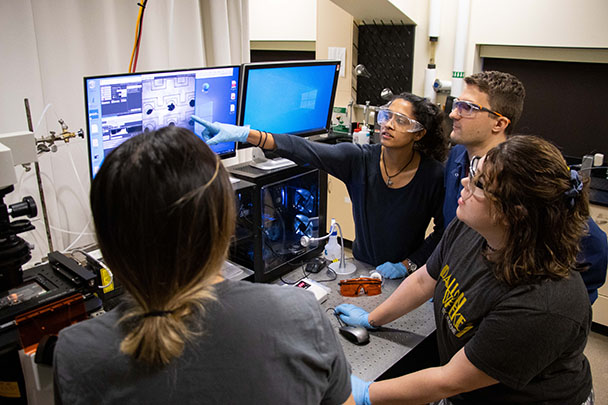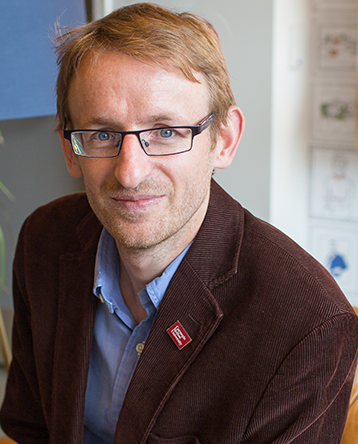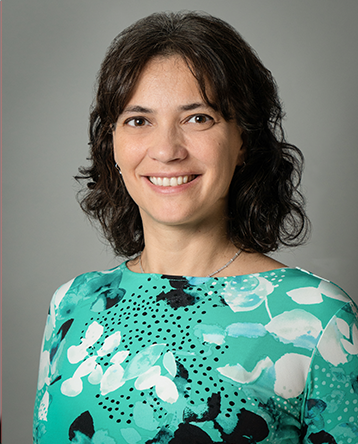At Carnegie Mellon University (CMU), we equip you to use chemical engineering science to solve real-world problems. Learn to use advanced numerical methods, computational fluid mechanics, and process simulation and optimization techniques to develop energy-efficient and sustainable manufacturing processes for new and existing products.
Our industry-relevant curriculum and unparalleled emphasis on computational expertise converge to shape your future. Prepare to make meaningful contributions to various industries or pursue a Ph.D. Complete a Master of Science (MS) in Chemical Engineering in four semesters with an independent research project or earn a Master of Chemical Engineering (MChE) in two semesters.
Why earn a master's degree in chemical engineering at Carnegie Mellon?
Practical and industry-relevant curriculum
Our Master of Science and Master of Chemical Engineering degree programs provide a deeper understanding of the fundamentals of chemical engineering. Our core curriculum builds on your bachelor's-level engineering education, enhancing your problem-solving and mathematical modeling skills. You will have the flexibility to personalize your program with curated electives that match your interests and career goals.
Our programs empower you to model and solve complex scenarios in theoretical contexts and practical applications. View degree requirements for both programs.
Work with faculty experts
Our distinguished faculty lead research projects that prepare you for the challenges of the professional world. MChE students can gain insights from their innovative work by completing engaging coursework, and MS students can join their team and contribute to their findings.
Current research explorations by the chemical engineering department's faculty include:
- Air quality and climate
- Autonomous and data-driven sciences
- Biotechnology and pharmaceutical engineering
- Catalysis and surface science
- Energy, decarbonization, and sustainability
- Process systems engineering
- Soft materials and complex fluids
A one-of-a-kind computational focus
The MS and MChE programs have a unique computational emphasis that equips you with cutting-edge skills crucial for tackling complex challenges in chemical engineering. The Department of Chemical Engineering integrates computing throughout the curriculum, readying you for core areas of chemical engineering, such as reactor engineering, process systems, and transport phenomena.
As a CMU chemical engineering graduate student, you can access advanced mathematical modeling and simulation software you can use for coursework and research projects.

Collaborative facilities
Nestled within Doherty Hall, the department's cutting-edge labs and advanced computing facilities stand as hubs of innovation. Conduct research using state-of-the-art instruments and leverage high-performance computing capabilities.
We designed our research labs to encourage collaboration and cross-disciplinary thinking. Unlike traditional closed-room setups, the majority of our labs have open spaces that accommodate multiple research groups. This unique configuration enables interdisciplinary interactions and the seamless exchange of ideas between researchers.
Supportive environment for chemical engineering students
CMU takes pride in fostering a supportive community for graduate students. With half of our student population composed of master's degree and Ph.D. candidates, we understand the unique needs and aspirations that drive advanced academic pursuits.
The Department of Chemical Engineering has a close-knit and collaborative graduate student community. Many students join the Chemical Engineering Graduate Student Association (ChEGSA) and the Chemical Engineering Master's Student Association (ChEMSA), which organize social, academic, and networking events.

"Studying ChemE at Carnegie Mellon gives you the opportunity to learn about a multitude of scientific specializations through research and classes. You may choose to focus on experimental or computational work in disciplines ranging from nanoscience to process engineering. Through cutting-edge research and a supportive culture, you'll engage with people whose ideas and expertise can change the world."
Tim Schwartzkopff, MS, fall 2023
Which chemical engineering master's program should I choose?
Master of Science in Chemical Engineering
The MS in Chemical Engineering allows you to explore a specialized topic that interests you through an independent project. Consider this option if you want to pursue a Ph.D. in chemical engineering or engage in advanced research roles.
Completing the degree program requires the equivalent of four full-time semesters, in which the summer semester is focused on your independent project.
- Core courses (4) - Take core courses that focus on technical depth and software aptitude.
- Electives - Personalize your master's experience with curated electives from different areas of the College of Engineering.
- Independent project - Work with a research mentor on a three-semester independent project that specializes in one of the subdisciplines of chemical engineering.
Master of Chemical Engineering
The Master of Chemical Engineering program offers a more structured curriculum with an emphasis on gaining advanced knowledge and practical skills for immediate application in industry.
Full-time students typically finish the coursework-based degree program in two semesters.
- Core courses (4) - Take core courses designed specifically for master's students that focus on technical depth and software aptitude.
- Electives (4+) - Select courses from all areas of the College of Engineering that fit your interests and career goals.
Learn more about the MS and MChE degree requirements
Meet the Chemical Engineering faculty
Students in the MS and MChE programs learn from and research with world-class faculty at CMU. Learn more about our professors and their areas of expertise.
Careers and outcomes for chemical engineering students
The Department of Chemical Engineering's unrivaled computational focus allows you to learn pioneering techniques already revolutionizing the fields of materials and chemical discovery, among others. This unique feature is one of the reasons our graduates are some of the most sought-after candidates in both industry and academia. In fact, 90% of CMU graduate students who graduated in 2021 and 2022 have found jobs or are continuing their education.
Chemical engineering master's degree graduates go on to pursue doctoral degrees at universities such as:
- Georgia Institute of Technology
- Imperial College London
- Iowa State University
- Purdue University
- RWTH Aachen University
- University of Texas at Austin
- University of Illinois Urbana-Champaign
CMU chemical engineering graduates go on to work at companies such as:
- Amgen
- Deloitte
- ExxonMobil
- Intel
- Merck
- P&G
- PPG
- Samsung
- Sanofi
- Unilever
Recent job titles for our graduates include:
- Advanced process control and machine learning engineer
- Battery modeling engineer
- Data scientist
- Global strategic sourcing analyst
- Process engineer
- Product development chemist
- R&D scientist
- Research engineer
Mean salary*: $88,199
*Based on survey results from program graduates
See post-graduation salaries and destination information for recent CMU Chemical Engineering graduates.
Admissions and application deadlines
The department designed the MS in Chemical Engineering and Master of Chemical Engineering programs for engineering students interested in focusing on the highly versatile core expertise of chemical engineering. Prospective students must have earned a bachelor's degree in chemical engineering or a related discipline.
We accept applications and enrollment for both fall and spring semesters.
- Fall term of entry deadline: January 31
- Spring term of entry deadline: September 1
Take the next step
Gain practical expertise with the Department of Chemical Engineering's emphasis on computational skills and collaborative research. Earn a Master of Science or Master of Chemical Engineering from Carnegie Mellon University and unlock the power to revolutionize industries, pioneer sustainable solutions, and make a lasting impact on the world.



